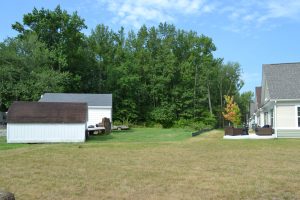
BERLIN – Town officials agreed to spend $95,000 to purchase a strip of land between Cannery Village and Flower Street in an effort to eliminate trespassing concerns.
In response to complaints from Flower Street homeowners who said Cannery Village residents were cutting across their properties, officials agreed to purchase land to create a public walking path and to erect a fence. The fence will be installed between Cannery Village and the three Flower Street homes closest to the entrance to the development while a walking trail will be created on the roughly one-acre piece of land at 507 Flower St. It will provide access from the back of the Cannery Village development to Flower Street.
“That property will now be the town’s…” Mayor Gee Williams said. “As part of this agreement we would be next spring putting in a hiking, biking, walking trail.”
According to the agreement approved Monday, the town will pay 507 Flower Street LLC — a subsidiary of Cannery Village — $70,000 at the time of settlement. The remaining $25,000 of the purchase price will be put in escrow and will be used by the town to install a six-foot high vinyl fence along the back property line of the three Flower Street homes closest to the Cannery Village entrance. That money will also be used to plant arborvitae along the Cannery Village property line.
“This contract is contingent upon Cannery Village LLC granting the mayor and council an easement to construct and maintain those items on Cannery Village’s property,” said David Gaskill, the town’s attorney.
Williams said the strip of land that constituted 507 Flower St. already contained a utility easement. Because of that, the town is not going to install a sidewalk on the property but rather a stone trail.
“It wouldn’t make sense to put the utilities down and then if we need to access them tear up the sidewalk,” he said. “A sidewalk would be in my opinion overkill.”
He said the trail, which would be suitable for walking and biking but not motorized vehicles, would serve as a prototype.
“Many neighborhoods are requesting these,” he said. “Here’s an opportunity to establish one and set a precedent. If people like it, it can be replicated in other parts of town.”
Flower Street resident Candy DeShields asked if the proposed fence could be extended to run behind all of the homes between Cannery Village and her street. Councilman Elroy Brittingham said all of the homes except the first three had enough of a buffer between them and the development.
“The three properties at the end have no barrier,” he said, adding that he thought the addition of arborvitae would screen the development as well. “It’s going to help a lot.”
The fence is expected to be installed later this summer while the trees will be planted in the fall.
Williams said that in addition to providing space for the walking trail, the lot at 507 Flower St. could also serve as a bus stop and would give the town more municipal space. Ideally, he said a playground for young children would be erected there.
“I can’t say how fast but that’s the vision,” he said.
Resident Zachery Tyndall, who has filed to run for a council seat in this fall’s election, asked if it was the norm for the town to buy property from a developer.
Williams replied that no one realized how close the Cannery Village homes would be to the neighboring lots.
“I don’t think any fair minded person would think that’s right …,” he said. “In a modern development, there should be some reasonable buffer. In hindsight, I think planning and zoning would agree if they’d known it was that close it would not have been a big deal to require as much space as the length of this room because the land was available.”
Tyndall said that $70,000 seemed like a substantial mistake and that he hoped the town would learn from it.
Williams said that now the town was asking potential developers to present more than basic drawings when they proposed projects in Berlin.
“What we’re now requiring is that they create something very visual,” he said.
Councilman Dean Burrell, who made the motion to approve the agreement, praised the mayor for the part he played in making the property purchase happen.
“This agreement did not come lightly,” Burrell said. “It came as a result of our mayor not accepting that a solution could not be found.”
Council member Lisa Hall, the only person to vote against the agreement with Cannery Village, said she did so because she couldn’t support spending $95,000 for a fence that could have been had at no cost if it had been required when the developer was seeking site plan approval for the project.
“It is a win-win for the community but we paid for it,” she said.
Resident Gabe Purnell said that while the fence might have cost the community it would also eliminate residents’ complaints.
Though the solution is coming later than she’d like, as she’s encountered Cannery Village residents cutting through her yard several times, DeShields said she’s pleased the town is addressing the issue.
“They’re letting us know they didn’t forget us,” she said. “They did hear us.”

